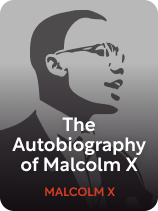

This article is an excerpt from the Shortform book guide to "The Autobiography of Malcolm X" by Malcolm X and Alex Haley. Shortform has the world's best summaries and analyses of books you should be reading.
Like this article? Sign up for a free trial here.
Why did Malcolm X establish the Organization of Afro-American Unity? What were its goals?
In 1964, Malcolm X broke ties with the Nation of Islam. He also traveled and spoke in Africa and returned to the United States with a renewed vision. A major part of his new strategy entailed the creation of the Organization of Afro-American Unity.
Keep reading to learn about Malcolm X’s Organization of Afro-American Unity.
The Context of the Organization of Afro-American Unity
The creation of Malcolm X’s Organization of Afro-American Unity was the product of his travels in Africa in 1964 combined with the racial atmosphere in the United States. He believed that he could import the liberation and harmony he witnessed in Africa. So, let’s start with what he experienced in his travels.
Malcolm X says that, first, he traveled to Nigeria, where he made several public appearances to discuss Black liberation. In one address, he spoke on the necessity of including Black Americans in the pan-African movement—an initiative intended to unite people of African ancestry around the globe, no matter where they now lived. He also argued that free African nations should bring the issue of American racism to the United Nations’ attention. After Nigeria, he traveled to Ghana, where he was invited to speak to the Ghanaian parliament about the need for pan-Africanist support of Black Americans. Then, he traveled to Liberia, Senegal, and Morocco to learn more about how Black people lived across Africa.
When Malcolm X returned to the United States from Africa in the summer of 1964, race riots had begun popping up across the country—and he explains that the press was making him the scapegoat for these riots. In response, he told reporters that it was time for Black Americans to stop asking the government for equal rights—they needed to organize alongside African nations and make their case to the United Nations (UN).
(Shortform note: The race riots of 1964 began in Harlem when a white off-duty police officer killed a Black teenager. The riots began as a protest march but escalated into a six-day clash between the protestors and police, followed by numerous other riots in cities like Philadelphia. Some experts on race relations understand race riots like these as an expression of anger about unanswered requests for racial justice—for example, Martin Luther King Jr. famously said that “riots are the language of the unheard.” Malcolm X believed that these requests would continue to go unheard, which is why he advocated petitioning the UN—a method that had been tried before by DuBois.)
However, the white press continued to paint Malcolm X as a violent instigator since he continued to insist on Black people’s right to self-defense against racism. While he no longer believed that white people were inherently evil, he explains that he did believe that living in a racist society made them dangerously arrogant and hypocritical. They despised having to consider the possibility that racism was wrong—and that therefore they were wrong. And, while they had no problem using violence to accomplish genocide, slavery, discrimination, and the spread of Christianity, they insisted on nonviolence from non-white people who threatened their power worldwide.
(Shortform note: In White Fragility, Robin DiAngelo argues similarly that living in a racist society has a negative effect on white people’s psyches. Specifically, she says that progressive white people are fragile—because they don’t want to believe that they’re doing something morally wrong, they can’t bear being criticized as racist. As a result, they react harshly to such criticisms and ultimately buttress white supremacy. Other experts have noted that hypocrisy about nonviolence continues to be a central feature of white supremacy—and that instead of emphasizing the need for a nonviolent response to oppression, people should focus on creating a system that doesn’t perpetrate violence against people of color.)
The Creation of the OAAU
It was in this context that Malcolm X established the Organization of Afro-American Unity (OAAU), whose goal was Black liberation and eventually racial harmony, which would be accomplished by means of pan-Africanism and Black nationalism. He believed that Black nationalism (which refers to Black people’s total self-governance) was necessary because, before they could truly unite with white people, Black people first had to recognize and become confident in their own essential humanity. The OAAU was open to Black people only. He explains that one reason for this was his belief that progressive white people should focus on teaching other white people how to become nonviolent toward Black people.
(Shortform note: The OAAU was the secular counterpart to the Muslim Mosque, Inc., and it was different from the MMI in at least one significant way: It employed women in leadership positions, which was unique because women were largely marginalized in key parts of the civil rights movement. Although the OAAU initially pursued Black nationalism (which can be traced back to Marcus Garvey, whom Malcolm X’s parents followed), Malcolm X stated in an interview a month before he died that he’d been rethinking Black nationalism—since it excluded some activists from participating in the struggle for liberation, he thought it might not be the most effective path forward.)
Malcolm X’s Last Speech
In The Autobiography of Malcolm X, Alex Haley explains that on February 21, 1965, Malcolm X was to give a speech to the OAAU at the Audubon Ballroom in Manhattan, New York. After he started speaking, there was a commotion—and, suddenly, he was shot. His wife and children were in the audience. She covered their children with her own body, and then she hurried to the stage to try to save him. He was rushed to the hospital, but it appeared that he was already dead by his arrival.

———End of Preview———
Like what you just read? Read the rest of the world's best book summary and analysis of Malcolm X and Alex Haley's "The Autobiography of Malcolm X" at Shortform.
Here's what you'll find in our full The Autobiography of Malcolm X summary:
- Malcolm X explains why he believed what he believed
- The historical and sociological context surrounding Malcolm X’s life
- Why Malcolm X was such a controversial figure






